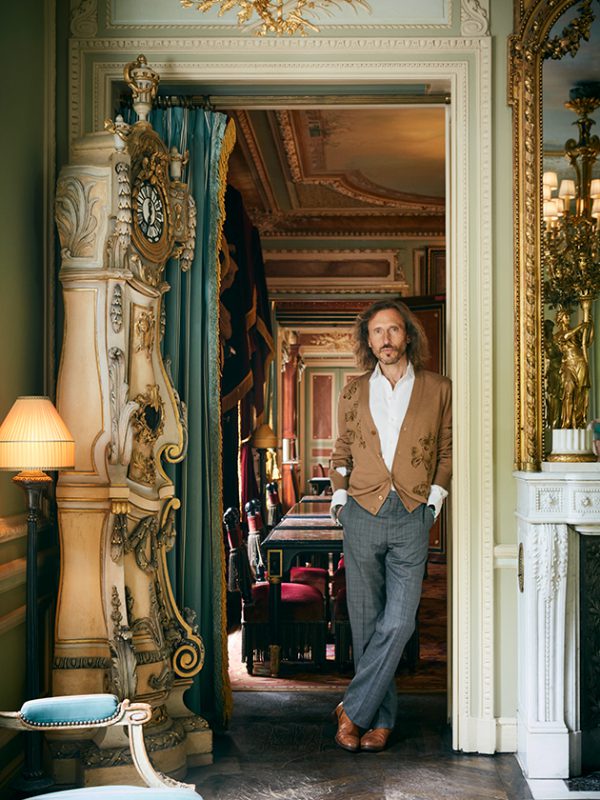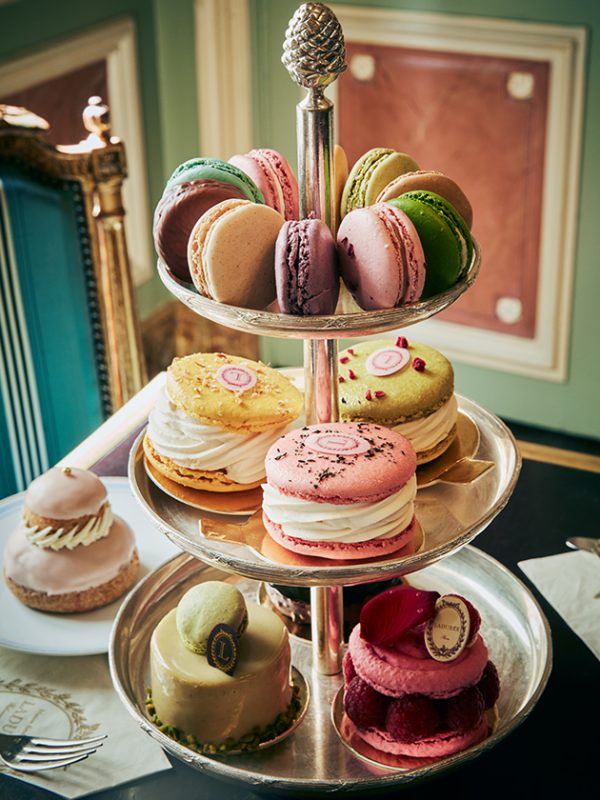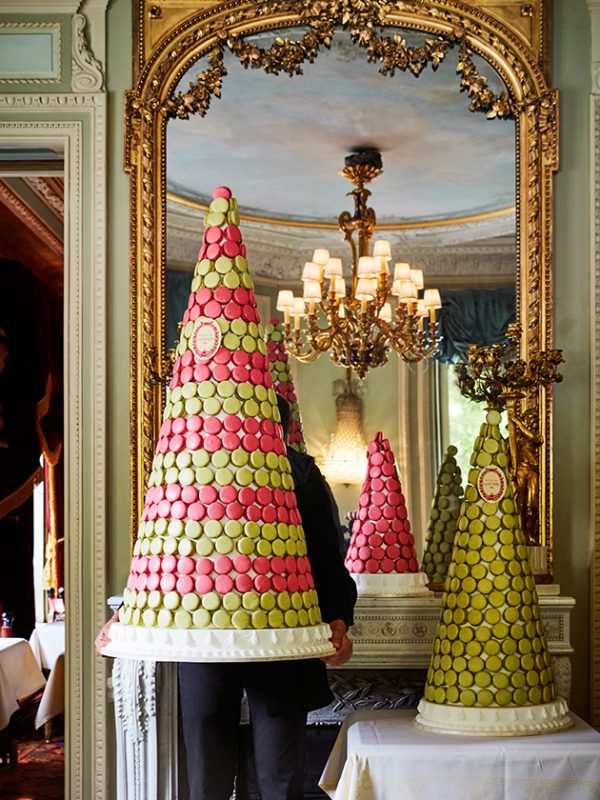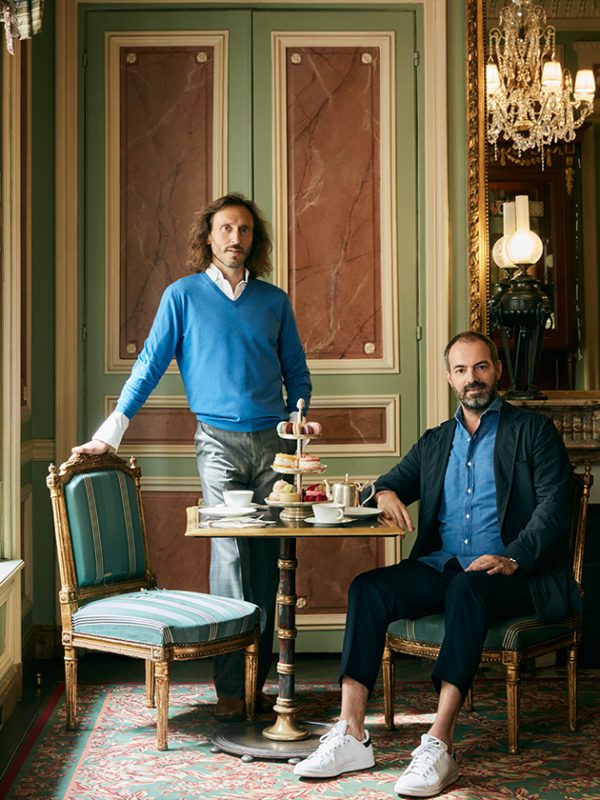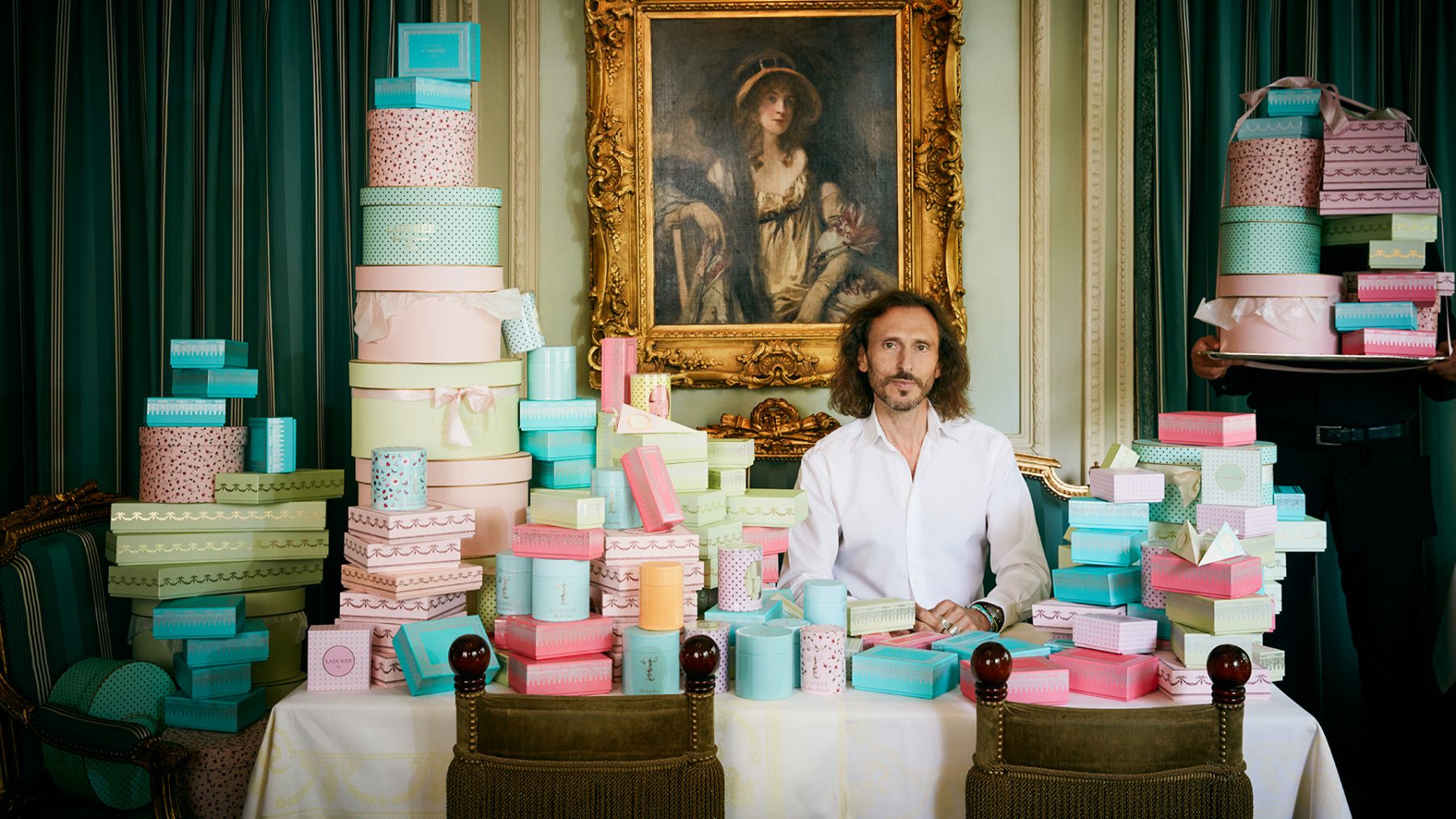Out of the Box by Michaela Cordes | 6th September, 2019 | Personalities
He is the rock star of pastry chefs and lord of the chicest sweets from France. David Holder was only 25 when he decided to conquer the world with the Ladurée macaron. Today, the son of a baker’s family from Lille owns 85 boutiques and Cafés in more than 30 countries, employs 1,400 brand and has transformed the traditional family business into one of the most admired luxury brands.
It’s nine in the morning on the Champs-Élysées in the biggest Ladurée café in Paris. People are already coming and going in the elegant, two-story salon. Not only tourists are enjoying breakfast at tables covered with white tablecloths. Meeting up at Ladurée is something real Parisians enjoy just as much. Downstairs in the pastry shop, several Ladurée waiters are sorting the freshly delivered macarons and putting the delicious looking tartlets on display. The air is filled with the delightful smell of powdered sugar, ground almonds and crispy croissants. “Bonjour!,” says David Holder, the man who is responsible for all this deliciousness. His look is more rock star than businessman: with his hair reaching to his shoulders and a big smile, he reaches out one hand with big silver rings gleaming on his fingers. Ladurée President and “Dream Leader” it says in gold letters on his business card. “This place has a lot of emotional meaning for me,” the Frenchman tells me and leads me through the spacious rooms of the very first café he created and that once served as offices for Japan Airlines. “When I saw this space all those years ago, I got goose bumps. I knew right away that this was the place from which I would be able to make my dream come true.” The dawn of a sweet revolution that started nearly 25 years ago…
Monsieur Holder – Ladurée macarons have conquered the world as a result of your passion. You were only 25 when you purchased the traditional Ladurée café. Founded in 1862, it was the only one at the time and situated on the Rue Royale in Paris. Today, your delicate almond pastries come in all colors of the rainbow and are available in 80 Ladurée boutiques in 30 countries. You employ 1400 staff and personally visit three cities a week to further the international expansion of your company. What’s the source of your seemingly unbridled passion and boundless energy? I think I inherited my passion from my father’s side of the family. Susanne, my grandmother, was a legendary personality in our first bakery, the only one in Lille back then. No one was a better sales person than she, and nobody could make our customers happier. My grandmother loved her work – you could feel it. My father had a deep-seated passion, too. I think we’re just a very creative family, always full of ideas.
You grew up in Lille, a small city in northern France. What was your childhood like? It was very simple. We only had one bakery and lived a modest but happy life. My father was the baker and my mother helped him in the bakery. In the ’70s, my father starting expanding and opened PAUL bakeries throughout France. I remember my childhood as being very happy and even though both of my parents worked, they still always had time for my sister, my brother and me.
“I inherited my passion from my father’s side of the family. No one could make customers happier or was a better sales person than my grandmother.” David Holder
Shortly before he turned 50, your father took you aside and urged you to learn the baker’s trade. What was your response? That was the beginning of my career. I was 20 years old and had just finished my degree in finance and global management in Paris. When my father approached me, I had actually been planning to do a master’s degree in the U.S. My father was 49, his own father had died suddenly at 51 after a similarly tough life as a baker, and so he was worried that he might die young as well. He said: Please spend two years with me so I can teach you everything you need to know about the trade. I didn’t hesitate for long because I felt what a gift it was to be able to learn from my father. And it was important to him because he was only 17 when he lost his father and had to learn the trade himself. He wanted to spare me this experience.
What was your dream back then, what did you want to do with your life? I had known from the age of 14 that I wanted to be a baker. Watching my father, and before him my grandmother, take the family business forward, was inspirational. I also knew that it would one day be my task to expand worldwide. My grandmother worked in our only shop in Lille, my father opened 50 to 70 bakeries throughout France and I quite naturally assumed that my generation would be the one to go international.
Can you describe your first steps? The first thing we did when I joined the business was to close half of our bakeries because we were operating under different logos and different management. In 1993 we did a relaunch with the new design concept – the black facade – that all bakery-cafés share. That was the rebirth of the PAUL brand.
Let’s return to when you were 20 and decided to become a baker in accordance with your father’s wishes. What do you remember from those days? That was the hardest time of my life. I wasn’t used to physical work for 17 hours at a stretch. In the first few weeks I lost seven kilos! My shift started at 11 pm with the preparation of the bread dough, the fermentation and division into loaves. All of that took seven hours, and we hadn’t even started baking yet. As soon as the bread was done, I started on the pastries that we baked all day long in order to have enough to sell during opening hours and also to deliver to restaurants and hotels. When you’re finished baking, you have to clean up and everything has to be clinically clean. I didn’t sleep for more than three or four hours a night, grabbed dinner whenever I could and only rarely had time to meet friends for a drink.
After you had finished your training, your father did something unexpected. Instead of handing the family business over to you, he held on to it himself. How did you react? Impatiently! I didn’t understand it right away, but I soon came to realize that my father and I were too alike and that having two strong personalities in the same company just wouldn’t work. Then luckily, almost like a miracle, Ladurée fell into our lap.
Before you bought the elegant café, you knew it well because your family had been going there for lunch every Saturday for about the last ten years … Oh yes, it was a family tradition to meet at Ladurée in the Rue Royale for lunch ever since I left Lille to go to Paris to study. That was in 1985. When we took over in 1993, we had been already loyal customers at Ladurée for eight years.
And you were only 25! Back then, there was only one Ladurée, the café in the Rue Royale, but the owners couldn’t decide on a successor and turned to your family for advice. What interested you about the project? I already had a vision of selling macarons worldwide and turning Ladurée into an international brand. My family decided to purchase 51% of the shares; 49% remained with the Ladurée family – for seven years, initially. Then we took over entirely. I spent two intense years from 1993 to 1995 learning all there was to know about the company and incorporating its DNA into my blood until I had grasped every imaginable detail about the traditional business from its company culture to its baking secrets.
Can you give us an idea of how far Ladurée has come since then by divulging how many macarons were sold every day in the Rue Royale and how many you produce today? Oh, I cannot say for sure, but let me think: In 1993 that one café in Paris must have sold about 1500 macarons a day. Today that number has grown to 18,000 a day worldwide…
It says on your website (www.laduree.com) that you also accept online orders. Is it true that you deliver to people’s doors in some countries? Yes, it’s a relatively new project that my sister Elisabeth has embarked on (Editor’s note: Elisabeth Holder is responsible for the U.S. side of the business). She sold a million more macarons in the U.S. in just the first eight months! Meanwhile, we’re testing the concept in France and England and are hoping to expand it further.
Why do you produce macarons in two different countries? The ones you sell in France are produced in France whereas the ones you sell around the world are produced in your factory in Switzerland. When I decided nine years ago to expand Ladurée internationally, I had to do some restructuring. To safeguard the company, I created another pillar on which to stand. Labor strikes are a common occurrence in France and I couldn’t afford the risk, so I went searching for a place where the quality of food and the quality of the raw materials was very much like it is in France. There’s a reason that the world’s best chocolate comes from Switzerland!
I’ve often asked myself why that is. Are the cows happier there than elsewhere in the world? They most certainly are! I’ve been living in Switzerland myself for the last nine years, near Gruyere, and I can assure you – it’s paradise: the mountains, the fresh, clean air, the happy people! And of course the quality of the things that I can buy locally – it’s absolutely fantastic. In addition, I have found people there who couldn’t be happier to work for Ladurée. Every time I visit our roughly 8,000 square-meter factory where we employ around 100 staff, it’s a celebratory event.
“We are fifth generation bakers – it was always clear to me to follow this tradition!” David Holder
Today, some 1400 people in Paris and Switzerland work for Ladurée which, like PAUL (comprising 450 bakeries in France), belongs to the Holder group, in other words, your family. You, the “Dream Leader” and president, have nevertheless invited your core team to acquire a stake in your company. Why? I think this has a motivational effect on my team. It’s also quite a lot of fun to be able to say, like I did a few days ago, that I have a board meeting to attend. The immediate response is always: Oh, so you now have investors? And I answer: Yes, my team! I really do have a team of ten people who are very important to the company and include my pastry chef and CEO. They are the ones who make Ladurée what it is every day and who are essential to our success. I call them my dream team and they’re my only investors. A couple of years ago I asked them if they would like to own 5% of the company and whether they would be prepared to invest money in it based on the evaluations carried out by independent experts every year. To my surprise, they came up with nearly two million euros, for which some of my staff even borrowed money from the bank!
How long have you been working with your team? Some of the staff have worked for the company for three or four years but most of them have been with us for 10 to 15.
When you are on the lookout for new international partners so as to open further Ladurée shops and cafés, do you still jump on a plane yourself to go to meet them in person? That’s right, nobody goes first but me. I need to be able to get a feeling for exactly whom we will be working with and for the location as well. I’ve also learned from past mistakes in this regard. There was a time when I would sign a contract for a place that I hadn’t actually visited myself, but those businesses didn’t turn out to be sustainable. The more unfamiliar a market is to me, the more time I spend there. I was recently in Shanghai, China, for an entire week, for instance, and will be leaving for Japan in about two weeks. We want to open new locations in Kyoto and Tokyo.
Do you work with franchise partners at all of your Ladurée locations? We’ve decided to go with the franchise model almost everywhere, with the exception of Great Britain (as it’s a European country), Switzerland and the U.S., where we invest ourselves. We work with franchise partners in every country where, for political or religious reasons, we would otherwise run a risk because we are simply too unfamiliar with the local culture. But I very much enjoy having contact with people whose culture is initially unfamiliar and learning from them. In Asia, for instance, we will be giving our interiors a more contemporary look. We’ve learned that many customers there are put off by interiors that have been decorated in the style of the 18th and 19th centuries because they think such places will be far too expensive and intimidating. So we will retain the Ladurée DNA but, at the same time, make the stores more accessible for young people.
How do you train your new Ladurée partners in Paris before they open their cafés? All of our pastry chefs are from France. We train the teams and key managers for several weeks or even months, depending how qualified they were when they were hired. I also have an international management team that travels around the world to ensure that all of our products always reflect the same quality and excellence. I would say that that is one of my biggest challenges right now. Expansion is easy, but having reason to be proud of each and every Ladurée store – that’s my challenge!
Is conquering the Asian market your next big hurdle? Absolutely – and certainly the biggest in all of our company history.
Ladurée macarons come in 10 standard varieties (and five seasonal ones). Which is your favorite flavor? Orange blossom, which was actually developed as a temporary, seasonal flavor. At the time it was on offer, I was negotiating business with my friend the Prince of Kuwait. In Paris, he bought five or six boxes of macarons as a gift for his mother – but only one flavor: orange blossom! I asked him why he only wanted one kind, telling him that it was only a temporary flavor. When I later flew to Kuwait to sign the contract, he refused, saying: I’m not signing. At first I was a little bit angry because I had flown half way around the world for this, but then I understood that he had a plan. He gave me a piece of paper and a pen, saying: I’ll only sign the contract if you promise to include orange blossom in your regular collection of Ladurée macarons. It’s the only way to make my mother happy! What shall I say: I signed that paper, naturally.
Is it difficult to develop a new macaron? It’s complicated. It takes around six to nine months to implement a new flavor.
In Paris, it’s fashionable to meet at Ladurée for breakfast, brunch, lunch or tea. In New York – thanks, certainly, to the American teen drama series “Gossip Girl,” – your Ladurée cafés have become hip meeting places for female millennials. That’s true! Eighty percent of our customers are female, and they’re getting younger every day. That’s why we expanded our range of products last summer to include, in addition to pastries, teas and scented candles as well as makeup and perfume with a macaron scent.
You made headlines a few months back when Meghan Markle, Duchess of Sussex, secretly held a baby shower in New York in your Ladurée café in SoHo. Were you notified in advance that a royal visitor was coming? Of course! The security aspect alone is reason enough to inform me. But it’s not like you’re told weeks ahead of time. The idea is probably to prevent too many people from catching wind of a royal visit like that.
How did the publicity affect you? It’s always good for us to have people talking about Ladurée, so it was naturally a very positive thing to be the automatic topic of conversation around the world.
Looking back, it’s quite funny to think that 157 years ago, Ladurée was virtually the only café in all of Paris where respectable society ladies could meet to drink tea. Before that, meeting someone for tea in public was not what a respectable woman did. But today, Ladurée cafés have become meeting spots for confident, fashion-conscious women around the world.Was that part of your original vision? No, it’s something that happened quite naturally because, over the past 15 years, we have very carefully and consciously developed the culture and dreams and values surrounding Ladurée. This is something I love! I’m very proud of what we have achieved.
Looking into the future, where do you see your company 25 years from now? I think the future of Ladurée will be exciting. I spoke to the press the other day to announce the launch of our first vegan Ladurée café in L.A. We’re opening on July 24. The traditional food will still be available, of course, but there will also be a vegetarian option. This mostly applies to the prepared dishes at the café. We will also be launching a superfood macaron with acai and other macarons with superfood ingredients, as well as vegan cakes, for instance a chocolate cake made with coconut milk. I’ve been a vegetarian for 20 years, but I never wanted to make my personal choice the company religion. The world has changed a lot in the last ten years, however, and I think it’s now time for Ladurée to begin offering customers vegan and vegetarian alternatives. Of course it helps to know from my own experience how good this lifestyle is – for our health and for our planet.
Last fall, after failing the first time ten years ago, you made a second attempt to set up shop in Berlin and opened a Ladurée shop in the Charlottenburg district, in the concept store The Corner. What do macarons and fashion have in common? Several years ago, my friends from the Galeries Lafayette in Berlin said to me: David, you have to come with us and open a Ladurée shop in our space. I wasn’t familiar with Germany at the time and had never been to Berlin. For the first time in my career, I didn’t visit the location myself before opening a shop. I still remember the day I arrived and saw my shop in the basement beside the food court. I knew immediately that it would be closing very soon again. And that’s exactly what happened. Sharing space with The Corner made much more sense to me because we were both selling the same lifestyle. Our customers don’t just come to buy pastries, they come for the experience! That’s why we always boost our brand by collaborating with people in the arts and fashion. We regularly create limited edition gift boxes with designers and artists such as Pharell Williams, Solange Azagury- Partridge or Vera Wang. We even developed a small collection of macarons with the performance artist Marina Abramovic inspired by the scents of her life. Later, there was a happening at which you could watch her eat one of those macarons – that was crazy!
Today, you’re about the same age as your father was when he took you aside to personally teach you everything he knew about the family business. Have you thought about who will succeed you? As it happens, I asked my son Simon a few months ago to learn the baker’s trade. He’s 22. But he quit after just a few weeks because he thought the work was physically too demanding. He’s working in Geneva now, learning the sales angle. But maybe my daughter Sasha, who is 19, will follow in my footsteps. She has my passion. Next year, she’ll be finishing her global management studies at Regent’s University in London. She’s really the image of me and has a lot of my energy!
